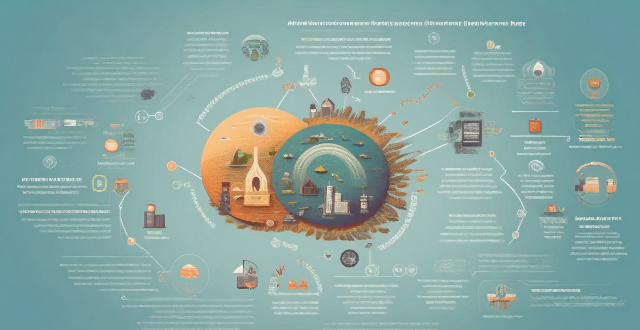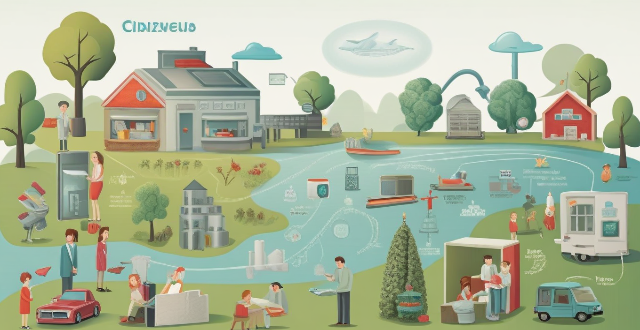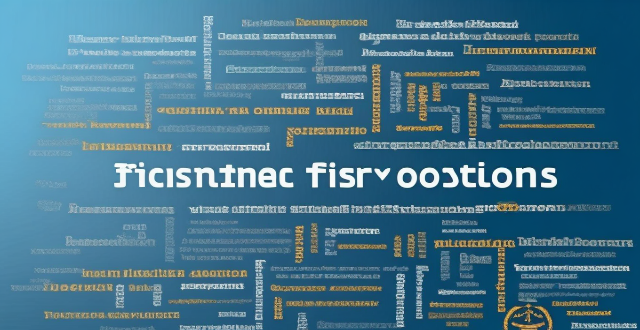Citizen Policies

How will the concept of citizen engagement change in future cities ?
This essay explores the future of citizen engagement in cities, influenced by technological advancements like AI and IoT, social media platforms, and demographic changes. Potential changes include increased participation through virtual town halls and online voting systems, greater transparency via open data and public dashboards, and more collaborative approaches such as co-creation workshops and community-led projects. The essay emphasizes the importance of adapting strategies for engaging with citizens to ensure vibrant, inclusive, and sustainable urban communities.

How can citizen science contribute to biodiversity research and conservation ?
This article explores the role of citizen science in enhancing biodiversity research and conservation efforts. It highlights how involving the general public in scientific projects can boost data collection, raise environmental awareness, and support conservation initiatives. The article also provides examples of successful citizen science projects that have contributed significantly to understanding and protecting biodiversity.

What is the impact of Brexit on UK immigration policies ?
Brexit has had a significant impact on UK immigration policies, including the end of free movement for EU citizens, the introduction of a points-based immigration system, a settled status scheme for EU citizens, changes in student visa policies, and increased scrutiny of immigration applications. These changes reflect the UK government's desire to regain control over its borders and shape its immigration policies according to national interests.

What are some examples of successful citizen-led climate initiatives ?
Successful citizen-led climate initiatives play a crucial role in addressing the global climate crisis. These initiatives are often driven by grassroots movements, community organizations, and individuals who are committed to taking action against climate change. Examples of successful citizen-led climate initiatives include renewable energy cooperatives, community gardens and urban farming projects, bike share programs, climate education and advocacy efforts, and waste reduction and recycling programs. These initiatives highlight the importance of collective action and individual responsibility in creating a more sustainable future for all.

What role do education and awareness play in promoting citizen action on climate change ?
Education and awareness are crucial for promoting citizen action on climate change. They help individuals understand the science, develop skills, foster critical thinking, raise consciousness, mobilize public support, and promote behavioral change. Strategies for enhancing education and awareness include integrating climate change into curricula, community workshops, media campaigns, and partnerships with NGOs and corporations. Investing in education and awareness is essential for creating a more resilient and equitable future.

How can cities encourage citizen participation in greening projects ?
This article discusses various strategies that cities can adopt to encourage citizen participation in greening projects, including education and awareness, volunteer opportunities, incentives and recognition, and collaboration with local organizations. By implementing these strategies, cities can create vibrant, sustainable environments that benefit both residents and the planet.

How can citizens participate in environmental monitoring initiatives ?
The text provides a detailed guide on how citizens can actively participate in environmental monitoring initiatives. It suggests joining local conservation groups, volunteering for citizen science projects, utilizing technology, educating and spreading awareness, advocating for policy changes, and collaborating with universities and research institutions as effective ways to contribute. These activities not only aid scientific research but also promote community involvement and responsibility towards the environment.

What policies can promote sustainable urban development ?
Sustainable urban development is crucial for creating livable, healthy, and prosperous cities. Here are some policies that can promote sustainable urban development: 1. Green Infrastructure: Promote green spaces, implement green roofs and walls, develop urban agriculture. 2. Energy Efficiency and Renewable Energy: Encourage energy-efficient buildings, promote renewable energy sources, implement smart grid technology. 3. Transportation: Improve public transportation, encourage active transportation, promote carpooling and ridesharing. 4. Waste Management: Implement recycling programs, encourage composting, promote zero waste initiatives. 5. Water Management: Implement water conservation measures, manage stormwater runoff, protect natural water resources. 6. Community Engagement: Encourage citizen participation, support local businesses, foster a sense of community.

What role do international organizations play in promoting environmental subsidy policies ?
International organizations play a crucial role in promoting environmental subsidy policies by providing information, facilitating cooperation, offering financial support, setting standards, and engaging in advocacy efforts.

In what ways do inclusive policies contribute to economic growth and development ?
Inclusive policies are crucial for economic growth as they ensure benefits reach all societal segments. Key contributions include increased access to education, improved health outcomes, enhanced labor market participation, promotion of social cohesion, stimulation of domestic consumption, and attraction of foreign investment. These policies create a virtuous cycle benefiting both the economy and society's well-being.

Can environmental subsidy policies help reduce carbon emissions ?
Environmental subsidy policies can help reduce carbon emissions by promoting renewable energy, enhancing energy efficiency, supporting waste reduction initiatives, and funding research and development of carbon capture and storage technologies. However, these policies must be carefully designed and adequately funded to avoid market distortions and ensure long-term sustainability without creating dependence on government support.

What measures can be taken to reduce income inequality in low-income countries ?
The text discusses measures to reduce income inequality in low-income countries. It covers topics such as education and training, economic policies, labor market interventions, social safety nets, land reforms, governance and anti-corruption measures, and international cooperation. The measures include improving access to quality education, implementing progressive tax systems, creating minimum wage laws, developing effective social assistance programs, implementing land reform policies, strengthening institutional capacity to combat corruption, and seeking foreign direct investment that aligns with sustainable development goals.

How do climate change negotiations influence national environmental policies ?
The influence of climate change negotiations on national environmental policies is significant, as they set international targets and promote technology transfer, financial support mechanisms, adaptation measures, stronger legal frameworks, and public awareness. These discussions help countries develop comprehensive policies that integrate climate considerations across various sectors, ensuring policy coherence and effective action towards global climate goals.

How can circular economy policies be integrated into urban planning ?
Integrating circular economy policies into urban planning is crucial for creating sustainable cities. To achieve this, cities can promote sustainable transportation, reduce waste and resource consumption, support local food production, promote green building design, and foster collaboration between stakeholders. By implementing these measures, cities can create a more sustainable environment for their residents while also reducing their impact on the planet.

Can climate variability be mitigated through international agreements and policies ?
The text discusses the potential of international agreements and policies to mitigate climate variability, highlighting their roles in setting goals, promoting cooperation, creating legal obligations, and raising awareness. It also explores the impact of various policies on emission reduction, adaptation, research and development, and education. However, it acknowledges challenges such as political will, economic considerations, equity and justice, and compliance and enforcement. The text concludes that while these measures are crucial, they must be part of a comprehensive strategy that includes local efforts, technological advancements, and individual actions.

How do environmental subsidy policies influence consumer behavior ?
Environmental subsidy policies aim to promote sustainable practices and reduce environmental harm by offering financial incentives. These policies can encourage green consumption, lower the cost of eco-friendly products, and raise awareness about environmental issues. However, they also face challenges such as insufficient incentives, unintended consequences, and limited scope and impact. Therefore, careful design and evaluation are crucial for ensuring their effectiveness in promoting sustainable development.

Can circular economy policies help reduce waste and pollution ?
Circular economy policies can significantly reduce waste and pollution by promoting reuse, recycling, and cleaner production methods. These policies incentivize businesses to design products that are easier to maintain and recycle, support sustainable business models like leasing and Product as a Service (PaaS), and encourage consumers to make environmentally friendly choices. Through such measures, the need for new raw materials decreases, energy consumption is reduced, and waste is diverted from landfills, all of which contribute to lower emissions and a cleaner environment.

How do circular economy policies promote sustainability ?
Circular economy policies promote sustainability by reducing resource consumption, minimizing waste and pollution, fostering economic growth within ecological limits, creating social benefits and jobs, and encouraging systemic change and collaboration. Key practices include promoting product longevity, eco-design, zero-waste initiatives, clean technologies, circular business models, green jobs training, and multi-stakeholder cooperation. These policies aim to transition towards a more sustainable future by keeping resources in use for as long as possible while incurring the least waste.

How do immigration policies impact the social integration of immigrants ?
The text discusses the impact of immigration policies on social integration, highlighting factors such as access to basic services, employment opportunities, language proficiency, cultural sensitivity, family reunification, and legal status. It argues that policies promoting these aspects can facilitate better integration of immigrants into society, creating a more inclusive environment where they feel valued and respected.

What are the benefits of implementing circular economy policies ?
Implementing circular economy policies brings environmental, economic, and social benefits. Environmentally, it reduces resource consumption, lowers greenhouse gas emissions, and improves waste management. Economically, it creates jobs, saves costs, and drives innovation. Socially, it ensures resource security, improves public health, and empowers consumers. Overall, adopting these policies shifts towards a sustainable system that prioritizes long-term planetary health.

How often should a business review its credit management policies ?
The frequency of reviewing your credit management policies will depend on various factors specific to your business. However, by conducting regular reviews and staying vigilant about potential issues, you can help ensure that your policies remain effective and aligned with your business goals.

What role do governments play in implementing climate policies ?
Governments play a pivotal role in implementing climate policies by setting regulations, offering financial incentives, raising public awareness, cooperating internationally, and planning infrastructure to combat climate change.

What are the latest immigration policies in the United States ?
The latest immigration policies in the United States have been evolving and changing rapidly. Key updates include the public charge rule, asylum policy changes, DACA renewal fees, visa restrictions for pregnant women, travel ban expansion, and migrant children at the border. These policies reflect a trend towards stricter enforcement and restrictions on both legal and illegal immigration. Advocates argue that these policies harm vulnerable populations and undermine America's historical reputation as a nation of immigrants.

Are there any drawbacks to implementing environmental subsidy policies ?
This text discusses the potential drawbacks of environmental subsidy policies, including increased costs for consumers, market distortion, administrative challenges, overreliance on subsidies, and unintended negative environmental impacts. It emphasizes the importance of careful consideration and effective strategies to maximize benefits while minimizing drawbacks.

How do environmental subsidy policies affect sustainable development ?
This topic summary discusses the impact of environmental subsidy policies on sustainable development. These policies aim to promote renewable energy, reduce pollution, conserve natural resources, and promote eco-friendly technologies through financial incentives provided by governments. However, challenges such as limited funding, inefficient allocation of funds, and unintended consequences can hinder their effectiveness. To maximize their impact, it is crucial to ensure efficient allocation of funds and consider the broader impact of these policies.

What measures should be taken to ensure compliance with biosafety policies in laboratories and research facilities ?
Ensuring biosafety compliance in laboratories and research facilities is crucial for the protection of personnel, the environment, and research subjects. Measures such as regular training sessions, competency assessments, clear policies and procedures, proper use of personal protective equipment (PPE), effective waste management, and well-developed emergency response plans should be implemented to create a safe working environment.

What impact do stricter immigration policies have on family reunification ?
Stricter immigration policies have a significant impact on family reunification, causing delays, increased costs, limited opportunities, negative socio-economic impacts, and challenges for children. Policymakers should consider these consequences when developing and implementing immigration policies that affect families.

What policies and international agreements aim to protect biodiversity ?
The text provides an overview of various policies and international agreements that aim to protect biodiversity, including the Convention on Biological Diversity (CBD), the United Nations Framework Convention on Climate Change (UNFCCC), the Ramsar Convention, the International Union for Conservation of Nature (IUCN), the World Wildlife Fund (WWF), the Nagoya Protocol, the Global Environment Facility (GEF), national policies and legislation, and the Great Ape Project. These initiatives are crucial for maintaining ecosystem health and human well-being, but face challenges in implementation and enforcement.

What are some common challenges faced during the implementation of climate policies, and how can they be addressed ?
Implementing climate policies faces challenges in political will, economic concerns, social acceptance, and technical limitations. Addressing these requires stakeholder engagement, policy coherence, innovation, and international cooperation.

How do immigration policies influence international relations ?
Immigration policies have a significant impact on international relations, affecting economic partnerships, diplomatic ties, and cultural exchange. These policies can attract highly skilled workers, boost innovation, and enhance trade relationships, but they can also lead to job market issues and social tensions. Cultural diversification from immigration can improve mutual understanding and respect between nations, while restrictive policies can hinder the movement of diplomatic personnel. A country's approach to refugees and asylum seekers can influence its global standing, and the handling of refugee crises can lead to political tensions. Economic migration can cause a brain drain or be viewed as a form of development assistance. Immigration policies are a critical area of focus for international relations due to their far-reaching implications.